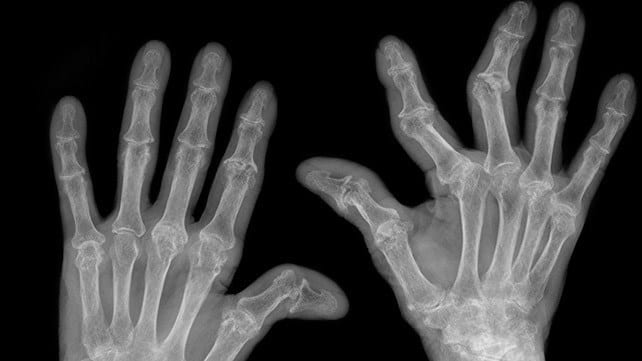Rheumatoid Arthritis is an autoimmune disorder that occurs when your own immune system mistakenly attacks your own body’s tissues. This can develop in those as young as 30. It is not an elderly disorder that so many are led to believe.
It affects the lining of your joints and this can then cause painful swelling and eventually lead to bone erosion and joint deformity.

Early Diagnosis:
A significant amount of damage can happen in the first 2 years of rheumatoid disease activity. An early diagnosis and effective treatment can significantly reduce the risk of negative long-term outcomes. Early diagnosis and treatment may even allow the possibility of preventative therapy.
In the early stages, people with Rheumatoid Arthritis may not see redness or swelling in the joints. But, they may experience tenderness and pain. These symptoms are clues to RA:
- Tenderness, joint pain, swelling, or stiffness that lasts for 6 weeks+
- More than 1 joint is affected
- Morning stiffness that lasts longer than 30 minutes
- Small joints (such as wrists, feet, and certain joints in the hands) are generally affected first.
If these are symptoms that you can relate to, it may be time to pay your doctor a visit.
How is Rheumatoid Arthritis (RA) Diagnosed?
It can be difficult to diagnose in its early stages because the signs and symptoms mimic those of many other diseases. Sadly, there is no blood test or physical finding to confirm a diagnosis.
During a physical exam, your doctor will check your joints for swelling, redness, and warmth. They may also check your reflexes and muscle strength.
Once your doctor has completed their physical exam they will also use blood tests and X-rays. We did say that there is no blood test to confirm rheumatoid arthritis but the doctor is trying to narrow down the list of possibilities. Especially when RA mimics other diseases.
What your doctor will also look for in your blood test results is more C-reactive protein (CRP) and elevated erythrocyte sedimentation (ESR/sed rate). If their rate is higher than it should be that can indicate the presence of an inflammatory process in the body i.e. Rheumatoid Arthritis.
If there is cause to go further, you will be sent for an X-ray. This will help your doctor understand your arthritis and its progression.
In the past, we have discussed a number of ways to better cope and treat arthritis. Please feel free to click on the links below for more information:
- Coping with arthritis over a busy period
- Top 5 benefits of water-based activities for arthritis
- 6 foods to help avoid inflammation with arthritis
- A holistic view on treating arthritis
- Why the Uccello Kettle is the best kettle for arthritic hands
If you are suffering with arthritis or know someone who is the Uccello Kettle is the ideal kettle for you. Click Here Now For More














Leave a Comment